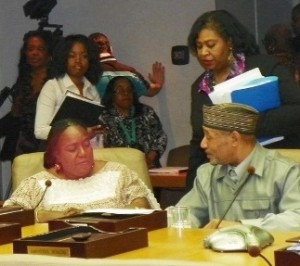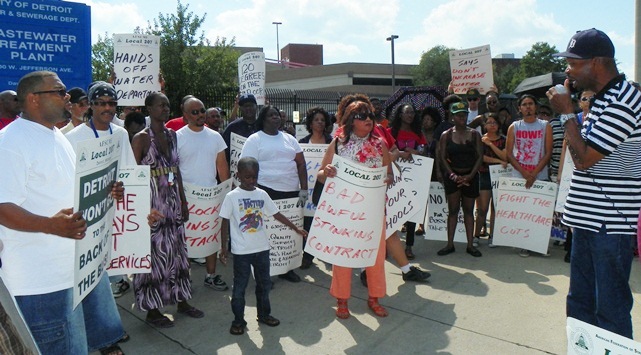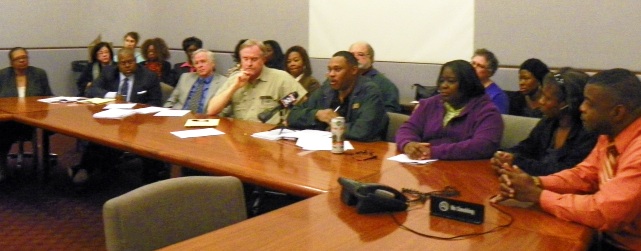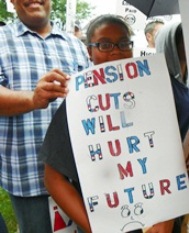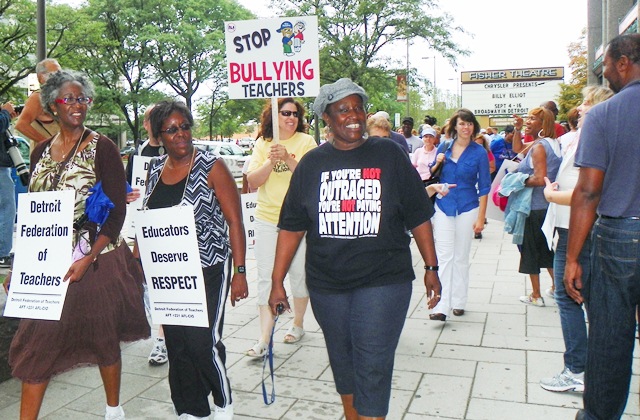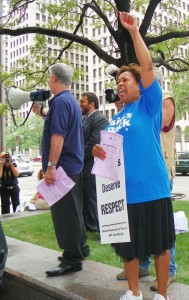Community explodes with fatal police shooting; Justice Dept. to probe incident
By Charlene Muhammad -National Correspondent–
Updated Aug 3, 2012 – 9:46:00 AM
(FinalCall.com) – The family of a man killed by Anaheim Police filed a federal civil rights lawsuit in the U.S. District Court against the city and police department on July 24, while an outraged community took its battle for justice to the streets with a rally at City Hall that same afternoon.
Lawyers filed the $50 million lawsuit against the city and its police department on behalf of Genevieve Huizar. Her son, Manuel Diaz, was shot, unarmed, on July 21 after running from police, according to police officials.
“They had already incapacitated him. They shot him once, got him on the ground, and then they shot him in the head. This was like an assassination and that’s why people are outraged,” said John Parker, West Coast coordinator of the International Action Center, an anti-war effort that also fights against racism and economic exploitation.
According to Sergeant Bob Dunn, Anaheim Police Department spokesperson, three officers are on paid leave as a result of officer-involved-shootings, not the protest. Officers shot and killed another man on July 22, in pursuit of a stolen car and also following a foot chase, he said.
Approximately 200 people surrounded City Hall for the July 24 rally while inside, council members unanimously voted to seek an independent review of the officer-involved shootings by the U.S. Attorney’s Office.
Early in the rally, a female protestor led call and response chants in English and Spanish: “What do we want? Justice! When do we want it? Now!”
The protestors attempted to enter Council Chambers but made it as far as the lobby, where they were met by uniformed officers—one in the lobby then three who secured the entrance to the chambers.
But when police in riot gear began to form a barrier between the entrance and demonstrators, the crowd chanted louder and tensions began to flare. “Tell me what a police state looks like,” a lone voice from a bullhorn rapidly instructed. “This is what a police state looks like!” protestors replied. “Just because you have a badge does not make you judge, jury and executioner,’” a man yelled during a tiny moment of silence.
Several hours later, the group of protestors numbered at least, 500-600, Ernest Arce, a journalist with 90.7 FM/KPFK, told The Final Call in an e-mail. The mostly young, very angry crowd left City Hall for a nearby intersection when police declared an unlawful assembly and began firing rubber bullets.
Once a large police line moved forward, some protestors began to break windows, smash trash bins and street signs, and vandalize businesses. “I attempted to enter the nearby Vons (grocery store) in order to take cover from police who seemed to be shooting indiscriminately but they were yelling at passersby not to get close because most of the supermarkets’ windows had also been smashed,” Mr. Arce recounted.
He witnessed at least five to 10 people who were bleeding from open wounds caused by the bullets and terrified Starbucks employees running out of the store as dozens of protestors smashed all of the chain store’s windows.
“It was total chaos for nearly 30 minutes. At least a half dozen fires were set throughout the downtown area as fire trucks were seen scrambling from one site to the next. In a moment too surreal for words, the Disneyland Resort launched its nightly fireworks show as it lit the night sky above what looked like a war zone below,” Mr. Arce said.
Anaheim sits in Orange County, about 26 miles south of Los Angeles. Hispanics make up 53 percent of the city’s population of 336,000, according to a 2010 U.S. Census.
Edgar Ibarra, a resident, told Mr. Arce he’s lost trust in the police and feels there’s a lot of corruption and cover-ups. “For the officers to gain the trust of the city, it’s going to take a long time. They’re going to have to rebuild their trust. At this point, we feel disgusted. At this point, we feel they’re bullying us,” Mr. Ibarra said.
The protest at City Hall came after a July 23 demonstration that stemmed largely from the Diaz shooting. During the protest, police fired pepper balls and bean bags into a crowd of men, women and children. One man was bitten by a police dog.
According to Sgt. Dunn, police were securing the scene of the shooting for about two hours, waiting for the district attorney to investigate when people began to leave their apartments.
“Known gang members tried to incite the crowd. … Officers noticed one they wanted to detain and when they attempted to do that, other members of the crowd encroached on the officers,” he told The Final Call.
According to Sgt. Dunn, officers shot the pepper balls to push the crowd back but when one man threw a bottle at them, they fired bean bag rounds toward him. “The dog’s deployment was actually accidental. He was able to escape when handlers got out to detain that individual,” he said.
Mr. Parker refuted the claim and likened it to driving under the influence, when drunk drivers who kill people are still responsible for creating situations for people to be killed.
“The cops did the same thing. … They got in a car drunk with racism, thinking they’re so entitled to attack toddlers, women, and the community with dogs and rubber bullets at close range. That’s an ‘accident’ waiting to happen and with recklessness,” he said.















